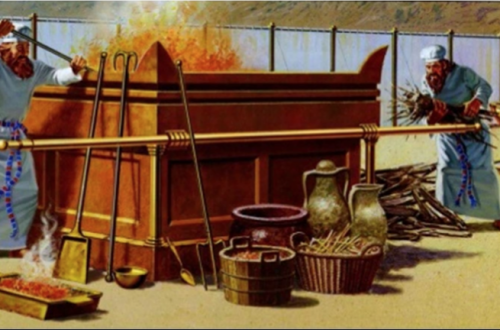The Outrageous Nature of God’s Grace
The contemporary cultural climate in the global north (as well throughout the majority world) has called for a long-overdue, renewed interest in the notion of "equity." After all, there is a legitimate concern for promoting fairness and justice, along with integrity and respect, among all people, regardless of their gender, ethnicity, and socio-economic status (a point made recently by Professors Darrell Bock and Ramesh Richard in an opinion piece at the Washington Post religion blog).
On the one hand, it is important to champion the cause of people being treated unfairly. On the other hand, we can quickly find ourselves consumed with comparing our lives to others. In turn, Satan can use this obsession to turn us inward on ourselves so that all our energies are fixated on what others get or have.
From there, we can become trapped in a narcissistic vortex involving the following sorts of self-talk: They make more than me! I deserve more than them! This corrosive mindset can even infect our spiritual lives. In short order, we can convince ourselves that we've been more faithful to God and that we deserve this or that blessing from Him more than others.
The issue raised by all forms of self-indulgent thinking is whether we really deserve any of the blessings God bestows on us. Of course, the answer is that we don't.
The outrageous nature of God's grace is illustrated by Jesus' parable of the laborers in the vineyard, which is recorded in Matthew 20:1-16. Only the first Synoptic Gospel links this story with the account of the rich young ruler appearing in 19:16-30 (see also Mark 10:17-31; Luke 18:18-30).
Matthew 19:30 and 20:16 are comparable to literary bookends that bracket Jesus' parable (technically referred to as an inclusio). In 19:30, the Savior declared that the affluent elites of His day, far from being archetypes of virtue, were exemplars of vice. In contrast, to their hubris and compulsion for personal gain were the outcasts of society. The integrity and humility of the rejects confirmed that they were God's faithful bondservants.
Accordingly, at the end of the age, when the Creator established full and final justice, realities, not appearances, would form the basis of His assessment of all humankind. From there, God's judgment would result in unexpected reversals.
The conventional wisdom was that more wealth, prestige, and power equaled blessings from God and a sure invitation into His kingdom. In contrast, the stark reality is that many who were first in this life in rank or status would be last at the consummation of the age when the Lord bestowed His heavenly rewards.
Jesus' parable compares the divine kingdom to a landowner who left his property early one morning to hire laborers to work in his vineyard. Back then, this would have been a familiar scene, for agriculture was the economic backbone of Judea.
The landowner, after arriving in the central square of the town, met some laborers who were seeking work. Typically, these would have been the indigent, who depended on the wealthy to hire them from one day to the next so they could eke out a living. It was customary for the length of the workday to be about 12 hours (i.e. from 6 a.m. to 6 p.m.).
We can imagine the landowner chatting with the group for a few moments before agreeing to pay each of them a denarius (a silver coin about the size of a dime that represented the amount of a typical day's wage). They would have understood that he was hiring them on a contractual basis. The laborers assumed they would receive a fair daily wage for their toil.
Later, around 9 a.m., the landowner returned to the marketplace to hire some more laborers. He vaguely promised that they would be adequately compensated for their work. Normally, haggling or bargaining over wages would occur in scenes such as this, but Jesus did not mention it in His parable. Undoubtedly, the current arrangement seemed like a good deal to these laborers. They trusted the honesty of the landowner, accepted his invitation, and agreed to toil in his vineyard.
Remarkably, the landowner didn't stop there. He repeated the same recruitment process throughout the day. It was as if he could not find enough laborers to do all the last-minute work. Specifically, he hired additional laborers at noon, 3 p.m., and finally 5 p.m.-which was only one hour before quitting time. In all, the landowner hired 5 installments of laborers at staggered times from dawn to dusk.
Finally, the end of the day arrived (i.e. 6 p.m.). The landowner told his foreman or steward to summon the laborers and pay them their wages. This directive reflected an established practice among God's people, in which the poor were paid their earnings on a daily basis (see Lev 19:13; Deut 24:14-15).
The customary practice would be to pay the laborers who were hired first. Yet, oddly enough, in Jesus' parable, the landowner reversed the normal procedure. Those who had only toiled for just one hour (that is, from 5 to 6 p.m.) were paid a denarius.
It is reasonable to surmise that these laborers were astonished, though pleased, with the landowner's decision. Presumably, when the early-bird workers, whom the landowner hired first, came to be paid, they imagined they would receive more than the laborers who had toiled less hours in the scorching heat. However, much to their dismay, they likewise received only a denarius.
The preceding outcome prompted the laborers who were hired first to protest. They resented being treated the same as those hired last. From the world's perspective concerning fairness (as noted above), the grumblers had a valid point. Whoever toils the longest and hardest is paid the most and receives the greatest rewards.
The central question, though, is what importance wealth, status, and length of service have in God's kingdom. Jesus' parable indicates that these variables are not a determining factor in receiving the Lord's declaration of pardon. Similarly, neither do worldly mindsets dominated by envy and greed.
Admittedly, for those who relate to the Creator with a mercenary attitude, the preceding truths are objectionable. After all, they regard cutthroat competition as the key to their coveted success and reward. Since this is what they have always conducted business, no other arrangement seems acceptable to them, whether in this life or in the one to come.
The outrageous nature of God's grace is that He makes His offer of salvation freely available to everyone. The preceding truth is evident by the way in which the landowner in Jesus' parable responded to one particular grumbler. This laborer was told that he was treated properly. He received exactly what was promised, and so the arrangement was a fair deal.
Perhaps much to the disgruntled laborer's consternation, the landowner had every right to pay a worker hired last the same amount as those he hired first, especially since the money originally belonged to the landowner. So, he had not defrauded this all-day employee. Instead, as the landowner surmised, the real issue was that the laborer resented the landowner's generosity to the other laborers.
Not surprisingly, Jesus warned that many religious legalists who now appear to be first in rank and status would be last in God's eternal kingdom. The reason is that they labored in the Lord's vineyard with a greedy mentality.
As Christians, we too can easily adopt the mercenary attitude of the grumbling laborers in Jesus' parable. And we can just as easily wallow in a toxic brew filled with self-righteousness, greed, and envy. Instead of repenting from such a noxious disposition, we might become even more resolute in being contractual when it comes to our relationship with the Redeemer.
From there, we can be consumed with bitterness at those whom the Spirit has blessed with more talents and larger responsibilities. Similarly, instead of repudiating this rancid way of thinking, we can convince ourselves that we deserve more from God simply because we have served Him for more years than other seemingly lesser-deserving believers.
The only escape from this quagmire is to abandon our merit-based outlook and accept the outrageous nature of God's grace. Jesus' parable teaches that we can trust the Lord to inundate us with His mercy, forgiveness, and kindness. When we come to terms with our eternally hopeless plight and receive without precondition the Father's declaration of "not guilty!" through faith in His Son, we respond to Him in gratefulness and love.
Moreover, the Spirit enables us to see that we are in good company with other sordid people of faith, including the following: David, who violated Bathsheba and murdered her husband; the Samaritan woman at the well, who was a serial polygamist; Zacchaeus, who used his position as a tax collector to gouge money from others; Peter, who denied Jesus three times; the woman caught in adultery; and Paul, who doggedly persecuted Christians.
An attitude of gratitude, then, is the order of the day for any of us, since all of us are beneficiaries of the Lord's grace. In response, we eagerly express heartfelt joy when anyone else becomes a recipient of the windfall of the Father's unmerited favor in union with the Son.



